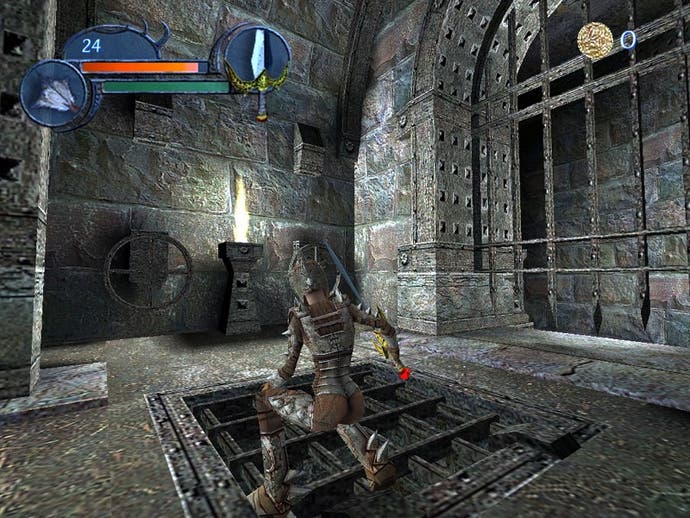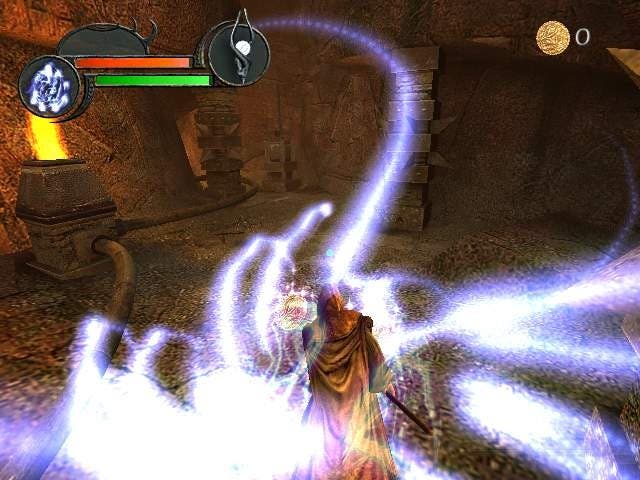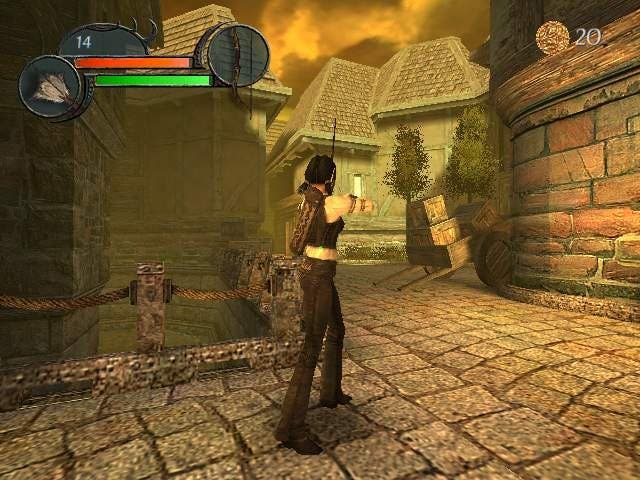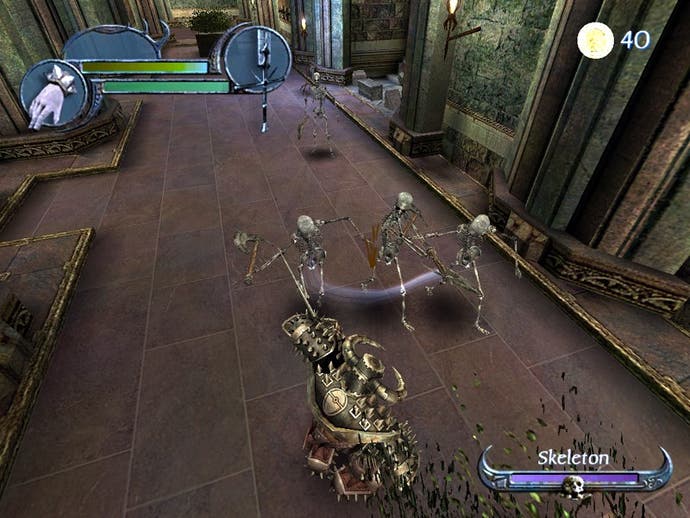Enclave
Review - after the agony of Azurik and Nightcaster, this makes a surprisingly welcome change

A Thing Of Beauty
I'm standing in a street. In any other game, I might say that I'm alone, but the world of Enclave is far from barren. Ahead of me are some steps leading up to a wooden double-door, flanked on both sides by marble pillars, with the partially-shredded standard of some otherworldly tribe draped across the top of it. I think I can see life on the battlements far above, but I can't be sure. To my right, the familiar sight of barrels creeps into view, but above it the wooden framework of a building juts out from the beautifully detailed masonry, and beyond that sits a withered tree, the incandescent light from several torches illuminating its contours and the crumbled pavement just in front of it. The whole scene is bathed in the eerie blue of nightfall, with shadows growing steadily darker the further up the stony walls they creep.
The world of Enclave certainly makes an impression.
Enclave is a game I've been waiting for impatiently, and staggeringly detailed visuals are just one part of its delectable makeup. This highly anticipated third person fantasy adventure game is easily the best of its ilk on Xbox, although admittedly that's not saying much when its competition is Azurik and Nightcaster… Nevertheless, it is very good, and unlike Halo's paint-by-numbers approach to photorealistic texturing, with grass breaking disjointedly into rockfaces, Enclave's world is virtually seamless - even the clashing of sword and shield, and the swooping of arrows is believable - and beyond its intricately detailed menu systems and in-game cinematics, its high definition texturing, abundant foliage and complex geometry, lurks a game marred only by a few significant problems, most of which can be overlooked to some extent.

Swapping Allegiances
Once upon a fantasy yarn, the forces of evil rose up and attacked the forces of good, and in order to end the machinations of the outlanders, a wizard leapt up and opened a rift between the two civilisations, segregating benevolence into its own little enclave, which then grew to thrive. Unfortunately, the outlanders were always jealous of those living in peace and serenity; as their enemies flourished, their numbers also grew, and before long the rift started to grow together once again, increasing the likelihood of an invasion.
Charitably speaking, it's a nice fantasy adventure with an obvious trail to tread. If we're honest though, we weren't exactly bowled over by the story. What makes the difference though, is that this world is so vividly imagined that it's a joy to step into, and once you've vanquished evil, Enclave turns the tale on its head and lets you play from the perspective of the bad guys. The two quests see you take on the roles of a lumbering swordsman, a dashing female archer and others, before swapping robes with the enemy and becoming a rampaging berserker, a dribbling orc, or some other equally unpleasant character. Models for both good and bad are equally impressive, and enemies you won't get to play as, not to mention numerous NPCs, all fit their detailed environment with smooth animations and heavyset expressions.

Slash, Rinse, Repeat
As you play through the game's 25-odd levels, you take up the mantle of several characters, depending on your preference, and between missions you are given the opportunity to equip them with numerous costly items. You can wander through levels quite quickly after a few goes, but fleeing the obvious path often yields more gold and health potions.
Gold is vitally important, because you won't be much use if you turn up to the final confrontation with only a puny dagger. Luckily the nature of the game allows you to head back into levels you've already completed in an attempt to rack up more gold, and if you try to avoid tussles and play the straight and narrow, you may have to do just this. Health potions are also worth watching out for, because the lack of save points during levels can mean a lot of repetition. Potions will help stave this off, but the inability to save mid-level is the game's first major error.
The two-stick control system with its logical left trigger shield, right trigger sword method won't take too much getting used to, but combat is simplistic and quite agonizing at times. Melee weapons force you to move in and out, quickly dodging blows and landing your own; trying to shield yourself from everything is only conducive to getting swamped, and as the camera locks behind you when you do this, you often have to trade off shield protection and simply being able to see what you're doing. Similarly, ranged weapons force you to back away endlessly or, if you're facing archers, to duck in and out of cover. As such, the process of fighting is an often laborious one and, in another blow, enemy and character animations fail to highlight contact - the entire system of registering hits is based on little hit point numbers which pop up when contact is made. This smacks of laziness on the part of the developer; by all means include it, but don't rely on it…

If Only
Level design is generally quite simple, but there is plenty of variety in locations, even within single missions. For instance, during the fifth level, the Divided City, you can slog your way through the streets and cross the rift into the outlands, or if you explore a bit more and rescue a wayward lass from the clutches of a nasty orc, she'll open a gate for you so that you can cut out half of your encounters and pick up a couple of potions before rejoining the normal route half way across town. Some levels involve escorting NPCs through ambushes and so forth, and these are pretty tense encounters. Sadly though, there is rarely any change in pace, and some of the objectives are needlessly repetitive - having to go into a place, dispatch everybody and then head back out of it through rooms freshly stocked with enemies is poor design, especially when replaying missions due to a lack of save points is a principle fixture of the gameplay.
It wouldn't be so annoying if the difficulty level wasn't just the wrong side of acceptable either, and the aforementioned fifth level is a good example. You will use two or three potions by the time you reach a heavily armoured berserker who takes an absolute age to bump off, and all the while you're being pelted with explosives by a group of Snotlings above you. Dispatching this vast menace and then dying at the hands of an explosion you had no chance of avoiding, and then having to replay the entire level, is a recipe for pure frustration. I threw my pad away on several occasions during both campaigns, and there was no need for that. Enclave is a perfectly lengthy game without having to do everything fourteen times.
While we're on the subject of shortcomings, the shiny water effect is perhaps a bit out of place here - amusingly, it looks too smooth to fit into Enclave's rugged environments - and there's the odd touch of slowdown when you're fighting multiple adversaries in an area of complex geometry, but I didn't feel that it interfered too often. In a sense, I'm clutching at straws. Deep down, I really like Enclave. If you can overlook the repetition to a certain extent, and fancy the prospect of delving into a richly detailed fantasy world, nothing should stop you doing so, least of all a half-baked water effect.
Conclusion
It's a shame that Starbreeze made the errors it did with Enclave, because the game is so very close to offering just the right balance. If you enjoy the odd fantasy adventure now and then, you should definitely give this a look. It's one of those games which will happily fill a morning or an afternoon, and the beautiful, seamless world set before you is enough to capture your attention for hours, even if you do end up playing the same sections repeatedly.

